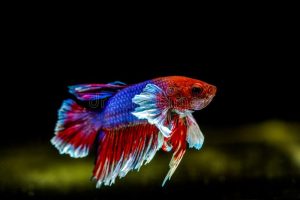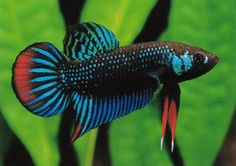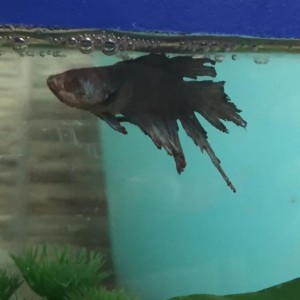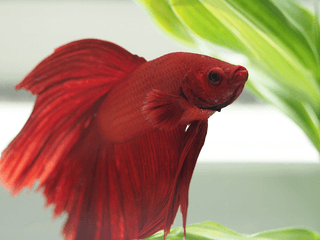You see him from across the room, all bright colors and radiant personality, virtually calling out to you “Hey you, come over here! Check me out! Am I not the most handsome thing you have seen all day? You know you want me baby…!
So who is this alluring creature that has captivated your heart and mind? It’s the magnificent betta fish! First things first, his name is “bet”-“tah” fish, not “bay”-“ta”. You don’t want to hurt his macho pride, do you? Well actually that’s just part of the story. His (or her) real name is Siamese Fighting Fish, or to be more specific (and accurate) Betta Splendens.
They come from Asia, specifically the tropical waters of Thailand (formally Siam). The natural habitat of this fish is the shallow streams and rice paddies of Vietnam and Thailand. These huge, shallow areas of wetland are where they carouse around rivers skimming insects, larvae and insect eggs off the surface of the water with their upturned mouths, and doing so wearing much less dramatic colors. Males are relatively territorial and will defend their own space from other fish, especially those who also have colorful, flowing fins. They love to hide, rest and play in the abundant foliage found in their natural habitat.
Around the 19th century people from Malaysia and Thailand began to collect these fish from the wild. They were kept for both bright color patterns and long flowing fins, as well as aggression. This developed in conjunction with staged fish fighting matches, apparently enjoyed by the King of Siam in 1840. In the wild these fish only spar for a few minutes, however in captivity they were bred for a willingness to continue fighting. Once a fish retreats, the match would be considered over. Luckily not a fight to the death!
One of the most fascinating facts about this unique fish is that it has a labyrinth organ, a defining characteristic of fish in the suborder Anabantoidei, which the betta belongs to, which allows it to actually obtain oxygen from the air above the surface of the water, instead of taking it from the water through their gills. The labyrinth organ helps the inhaled oxygen to be absorbed into the bloodstream, and develops from expansion of a bone in the first gill arch. As a result, like all labyrinth fish, they can survive for a short period of time out of water, provided they stay moist. For a betta fish to stay healthy, it is critically important for them to periodically get some exercise as well as use their labyrinth organ to obtain air. Betta fry (babies) are 100% dependent on getting air through their gills, until their labyrinth organ fully develops at around 3-6 weeks of age.

So now we have a purpose bred beautiful and aggressive, beloved aquarium fish with an air breathing super power and one heck of a personality! Actually they all have different personalities, some more peaceful than others, which is what makes putting them in a tank with other fish, let’s just say, interesting! Read on for more about that!
Other fascinating facts about them include, that the males blow bubble nests which they use to carefully tend and raise the eggs (after the female that deposited them, has been chased off, since she will most likely eat them), that they like to sleep in hammocks, they can be taught tricks, that they come in an amazing variety of more than 9 color patterns, and at least 14 different fin and scale patterns (like crown tail, double tail, half-moon, etc.), that besides food and clean water they need exercise, friends, and rest (so no lights on 24 hours a day), to stay healthy.
So how long can I expect my betta to live?
An interesting survey recently showed that most bettas live about 2 years, a few to three, fewer still make it to 4, yet nearly as many that make it past 2, make it past 5. These are fascinating statistics. This means most bettas live to either 2, or much longer, with not much in between. Knowing that most bettas are at least 6 months to a year old before you purchase them (they wait until full sexual maturity at about 4-5 months of age to begin selling them, so that you can see their fully developed fins and colors), and that most make it to an age of two, my suspicion is that the way that most people keep and care for them, is sustainable only about 12-24 months before the long term stress of mismanagement begins to take it’s toll. Well how hard can it be to take care of a little betta fish in a bowl? The answer is, it’s not hard, it’s actually quite easy, as long as you care careful about 1 key thing:
Do not do once weekly complete water changes!
I see this one little oversight taking the lives of more betta fish than any other problem. So why is this such a big deal? Because your fish eats food, which then turns into fish poo, which is made up of ammonia, which is eaten up by all the invisible good little bacteria that live on the gravel, in the water, on the plants, and on any and all other surfaces inside the tank. If you dump out the water each week, and worse yet, rinse all the gravel, and plants, you each week are killing off the beneficial bacteria which are vital to the good health of your fish. If you have no good bacteria, then each week your fish is exposed to toxic levels of ammonia. Even though it may only be at toxic levels for a day or two until you do that full water change, over time this continual stress takes it’s toll on your fish’s immune system. So it’s like spending one full day a week in a crowded bar full of smokers with no windows. Eventually you are going to develop a cough, or worse. The same thing is happening with your fish. They are amazing little creatures that can tolerate a lot and still survive, yet they do much better with slow changes in all things. Therefore don’t change all the water once a week, do a 25% water change every 2-3 days, and watch your fish thrive! And make sure that water stays around 78-80 degress F, after all, these little ones came from Asia!
Additionally, the have small stomach’s about the size of their eyeball, so feed them at least once, but more like twice a day, just enough that they eat it all in one meal (floating uneaten food is your second worst enemy to fish health besides water quality). Here is a little video clip I did on the topic of feeding What do betta’s eat in captivity?
Also ensure they have an enriched environment, this means interesting things to explore, and mix it up regularly with plants, rocks, ornaments, ceramic tubes, floating ping pong balls, moss balls, and other smooth objects (no clay flower pots with sharp edges/chips that can snag fragile fins). Nourishing your fish’s mind is just as important to his long term health as nourishing species specific food (never generic aquarium fish food to bettas, only food meant just for them).

So what about the size of the tank? One fish in a 5 gallon tank is a MINIMUM! Anything smaller than that is just not adequate. Bigger is better, and much easier to take care of, to boot! And what about friends in the tank? Well would you like to be in solitary isolation your whole life? Probably not, and neither does your fish. Even though males are solitary in the wild, they are surrounded by all manner of other species of fish. You can mimic the same by making smart choices of fish to share their space. One of the better choices are corydora (little clear/silvery fish and you need at least 6 for them to be happy), and they also prefer a Ph up to about 7. Clown pleco’s, a colorful algae eater is another good choice. This one is smaller than some of the other pleco variety’s and will give the added bonus of eating algae in the tank too although, you will want at least 20 gallon tank for a fish of this size. Guppies are another option although sometimes the bettas will pick at them if they have flowing tails. There are reports of betta’s getting along with no problems in other kinds of community fish tanks, as well.
Adding new fish must be done carefully, from an adequate quarantine period, to monitoring fins as some betta’s are more aggressive than others. In general the more space and interesting places to hide and explore, the less stress and everyone will have a higher chance of getting along. Of course you don’t want to have 2 male bettas, or a male and female, as both situations lead to aggression. Some people choose to keep betta’s alone in a 5 gallon or larger tank to not risk it or hassle with it at all. If you choose this then keep in mind your fish will need more maintenance and interaction to stay happy and healthy. You will want to play laser tag, and/or add the other other enrichment ideas already discussed, on a regular basis to keep your only fish child happy.
I have done everything I could, but my fish is sick anyway, now what?
Finally, so now you now most of what you need to know, yet your little fish is sick anyway. How can I be sure my fish is sick, and what do I do first? Here is a video I did based on what one client asked me Why is my betta pale and not swimming? Other ways you can tell a fish is sick is have they have worn, frayed fins, growths or abnormalities on their bodies, or they do not eat. So first things first if you suspect your fish is sick:

- Get a water quality test kit, and use it, daily while the fish is sick, and once a week thereafter, for as long as your fish lives. Most importantly make sure the ammonia and nitrites are zero. If they are not? Daily 25% water changes (not more) until the conditions are right. Be sure to add something to remove the chlorine from tap water, too, and it helps to add a little beneficial bacteria (available at your aquarium store).
- Double check the temperature and make it right, between 78-80 F.
- Before spending money to add chemicals and treatments recommended by someone, if your fish is still not doing well and you have done the above, your next step is to call an aquatic veterinarian! One near you can be located through these sources: World Aquatic Veterinary Medical Association, American Veterinary Medical Association, American Association of Fish Vets. If there is not one near you, then reach out to the one nearest you, who can then possibly guide your local small animal or exotic vet in the treatment and care of your sick fish.
So how long can a betta fish live? Well with proper care, enrichment, exercise, and great water quality, bettas have been know to live up to 9 years. However, if yours does not live that long, it does not mean you have necessarily done anything wrong. We often don’t really know how old the little one was before you got him or her, or what they might have been exposed to, or what their genetics were before they came to be in your care. All we can do is arm ourselves with education, love and devotion. It’s the least we can do for them, after all the joy, smiles, and entertainment the little beings bring to us.
On that note I am DrQ, here with best wishes for your fishes! If you have tried all of this and still have a sick fish, please contact me for a consultation http://www.drkoi.com Please leave comments, share, and follow me on our favorite social media site such as Facebook, Twitter, Instagram, and Linkdin for more valuable animal care information. Thank you!

